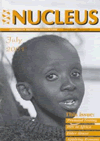They also propose new quality standards in screening for HIV, hepatitis, rubella and syphilis.
At present, only 20% of newborn babies in the UK are screened for CF. Currently many children go undiagnosed, and until identified may suffer in the interim. Most are regarded as malnourished by the time of diagnosis.[1] Early screening is believed to have significant benefits in the treatment and quality of life for babies who inherit the debilitating illness as they can be given immediate treatment to minimise the effects of the condition. The news has been welcomed by organisations such as the Cystic Fibrosis Trust. Mark Barron, communications manager of the Trust described the proposal for universal screening as ‘fantastic news.’[2] Every year about 1,000 babies in the UK are found to have Down’s syndrome. The standard technique used to diagnose Down’s syndrome in utero is amniocentesis which involves the insertion of a hollow needle into the womb to remove fluid which can then be tested for a variety of conditions. It is widely recognised that the test carries a risk of miscarriage, but the figure quoted is usually less than 1%. However, new research carried out at St Bartholomew’s Hospital in London compared the risks and benefits of the procedure for the first time and the results suggested that the technique may in fact result in the miscarriage of four healthy fetuses for every one it diagnoses.3 The number of mothers in the UK who undergo an amniocentesis test is currently about 40,000 per year. The technique is usually carried out on pregnant women if either a routine blood test or an ultrasound scan have raised any concerns. However, according to Professor Rebecca Smith-Bindman, who carried out the research at Bart’s, most women are recommended for amniocentesis on the basis of features which are highlighted by ultrasound scans but are mostly harmless to the baby and which almost always disappear during pregnancy.[3]
The risks of having a child with Down’s syndrome rise with age. For a woman of 35 the risk can be around one in 300. This is becoming more of a problem as growing numbers of women are choosing to have children later in life. Leading health experts have called for the use of a non-invasive test which would analyse the small number of nucleated red blood cells found in the maternal bloodstream early on in pregnancy. However, this will not be available to the public until 2004.
Of the 1,000 Down’s syndrome babies currently detected each year over 95% are aborted. Abortions for fetal handicap make up only 1.1% of the 170,000 abortions carried out in Britain each year, but over 90 are performed on infants of viable age, occasionally even up to 39 weeks gestation.[4] Why does society regard this as acceptable when deliberately killing a premature Down’s syndrome baby would be considered scandalous? Indeed the disclosure that Down’s children had been denied potentially life-saving heart operations at London’s Royal Brompton hospital earlier this year provoked considerable criticism from all levels.[5] Why is the government introducing this policy to ‘search and destroy’ babies affected by CF when, thanks to medical advances, the median life span of CF patients has tripled from about eight years to 30 years in the last 30 years alone?[6]
Although correcting the genetic abnormality in Down’s syndrome remains a future challenge, supportive care and surgical correction of associated anatomical abnormalities is a present reality. For cystic fibrosis, a combination of therapeutic measures including mucolytics, airway clearance techniques, anti-inflammatories, antobiotics, pancreatic enzyme supplements and the advent of specialised treatment centres have meant vast improvements for patients’ quality and quantity of life. And gene therapy holds even more promise for the future.[6]
Surely making prenatal testing available to all pregnant women is purely pandering to our society’s consumerist attitudes towards pregnancy and childbirth? Surely it will only encourage women even more to think of their babies as mere commodities? Many parents will not even contemplate having a child with any form of handicap and the majority of screening is undoubtedly conducted with the primary aim of seeking out and killing fetuses with disabling conditions such as Down’s syndrome. Such a policy further devalues the lives of handicapped people n a culture that already has a very narrow view of what constitutes perfection and therefore value. Screening with the purpose of initiating treatment early is surely a good thing, yet, whilst undoubtedly a part of the government’s plan, the policy of ‘search and destroy’ is not in line with the general goals of medicine.
It would seem that the government is seeking to appear to be acting out of concern for those with special needs whilst deliberately trying to decrease their numbers. Of course the costs, both financial and emotional, of caring for a handicapped child cannot be ignored. However, our obligation as Christians must be to ‘carry each others burdens’ (Gal 6:2) and, particularly as members of the medical profession, we should be seeking to improve quality of life, for example through earlier therapeutic interventions, rather than taking it. A stark contrast to the Darwinian ethic of ‘survival of the fittest’ so evident in our culture today.































